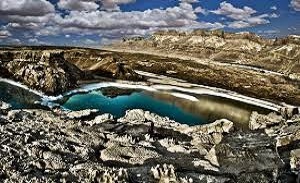The Dead Sea and Its Importance in Islamic Tradition
 Located between Jordan, Israel, the West Bank, and Palestine, the Dead Sea is one of the most unique places on earth. At 1,412 feet below sea level, its shores rank as the lowest land point on earth.
Located between Jordan, Israel, the West Bank, and Palestine, the Dead Sea is one of the most unique places on earth. At 1,412 feet below sea level, its shores rank as the lowest land point on earth.
With its high mineral and salt content, the Dead Sea is too salty to support most forms of animal and plant life. Fed by the Jordan River with no connection to the world's oceans, it is really more lake than sea, but because the fresh water feeding it soon evaporates, it has a salt concentration seven times greater than that of the ocean. The only life that can survive these conditions are tiny microbes, yet the Dead Sea is visited by thousands of people each year as they seek spa treatments, health therapies, and relaxation.
The Dead Sea has been a recreational and healing destination for millennia, with Herod the Great among the visitors seeking the health benefits of its waters. The waters of the Dead Sea are often used in soaps and cosmetics, and several luxury spas have sprung up along the shores of the Dead Sea to cater to tourists.
The Dead Sea is also a critical historical site. In the 1940s and 1950s, the ancient documents we now know as the Dead Sea Scrolls were found about one mile inland from the northwestern shore of the Dead Sea (in what is now the West Bank). Hundreds of text fragments, found in caves, proved to be religious texts of critical interest to Christians and Jews. To the Christian and Jewish traditions, the Dead Sea is a site of religious veneration.
According to Islamic tradition, however, the Dead Sea also stands as a sign of God's punishment.
The Islamic View
According to Islamic and biblical traditions, the Dead Sea is the site of the ancient city of Sodom, home of the Prophet Lut (Lot). The Quran describes the people of Sodom as ignorant, wicked evildoers who rejected God's call to righteousness. The people included murderers, thieves, and individuals who openly practiced immoral sexual behavior. Lut tenaciously preached God's message, but to no avail; he found that even his own wife was one of the disbelievers.
Tradition has it that God severely punished the Sodomites for their wickedness. According to the Quran, the punishment was to "turn the cities upside down, and rain down on them brimstones hard as baked clay, spread layer on layer, marked from your Lord" (Quran 11:82–83). The site of this punishment is now the Dead Sea, standing as a symbol of destruction.
Devout Muslims Avoid the Dead Sea
The Prophet Muhammad reportedly tried to dissuade people from visiting the sites of God's punishment:
"Do not enter the place of those who were unjust to themselves, unless you are weeping, lest you should suffer the same punishment as was inflicted upon them."
The Quran describes that the site of this punishment has been left as a sign for those who follow:
"Surely! In this are signs for those who understand. And verily, they [the cities] are right on the highroad. Surely! Therein is indeed a sign for the believers." (Quran 15:75–77)
For this reason, devout Muslims have an aversion to the Dead Sea region. For Muslims who do visit the Dead Sea, it is recommended that they spend time recalling the story of Lut and how he stood for righteousness among his people. The Quran says,
"And to Lut, too, We gave wisdom and knowledge; We saved him from the town which practiced abominations. Truly they were a people given to evil, a rebellious people. And We admitted him to Our mercy; for he was one of the righteous." (Quran 21:74–75)
By Huda
Source: learnreligions.com/
